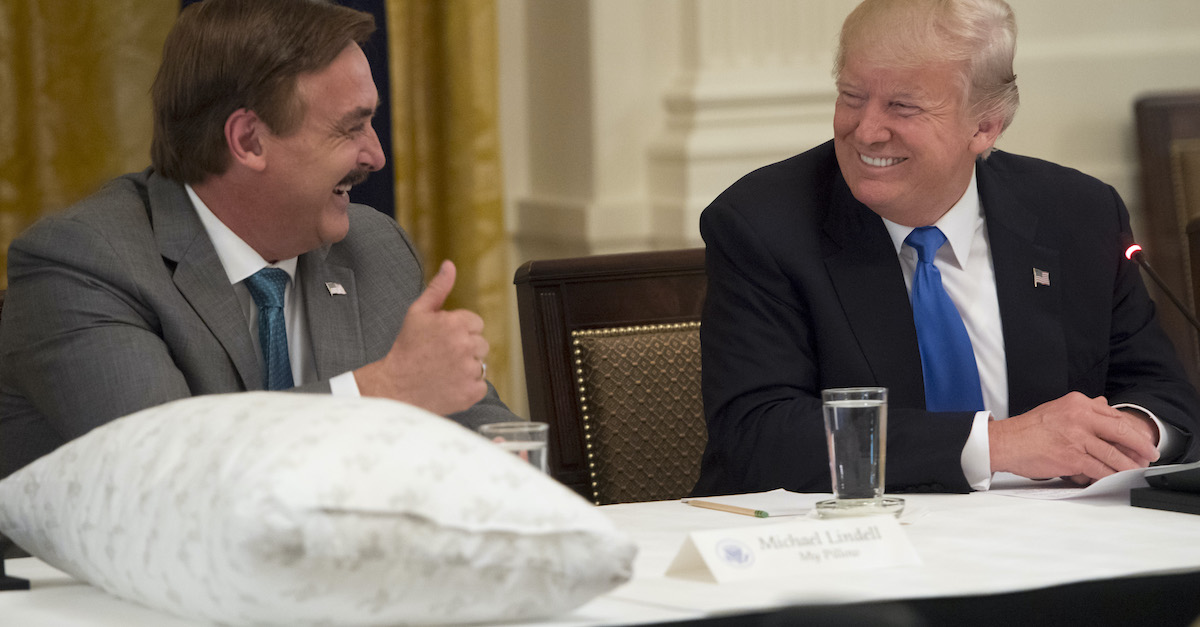
Is he happy now?
Dominion Voting Systems on Monday made good on their threat to sue MyPillow CEO Mike Lindell, filing a $1.3 billion defamation lawsuit. Dominion says Lindell falsely accused the company of rigging voting machines to steal the presidential election from Donald Trump.
According to the complaint, filed in the U.S. District Court in Washington, D.C., Lindell’s decision to back Trump’s erroneous claims about winning the election were about selling more of his company’s products, not about trying to protect voting integrity.
“After hitting the jackpot with Donald Trump’s endorsement for MyPillow and after a million-dollar bet on Fox News ads had paid out handsome returns, Michael Lindell exploited another chance to boost sales: marketing MyPillow to people who would tune in and attend rallies to hear Lindell tell the ‘Big Lie’ that Dominion had stolen the 2020 election,” the complaint stated. “He is well aware of the independent audits and paper ballot recounts conclusively disproving the Big Lie. But Lindell—a talented salesman and former professional card counter—sells the lie to this day because the lie sells pillows. MyPillow’s defamatory marketing campaign—with promo codes like ‘FightforTrump,’ ’45,’ ‘Proof,’ and ‘Qanon’—has increased MyPillow sales by 30-40% and continues duping people into redirecting their election-lie outrage into pillow purchases.”
The suit also noted that Lindell sought Trump’s endorsement to promote other products unrelated to his bedding empire, including an extract from a poisonous shrub that he touted as a “miracle” cure for the COVID-19 pandemic that had been “tested by over a thousand people.”
“When pressed to provide evidence supporting his claims, Lindell was unable to do so, but claimed that there had ‘absolutely’ been Phase 1 and Phase 2 testing (there had not) and that it will ‘get[] approved by the FDA’ (it did not),” the suit stated. “Rather than approving Lindell’s plant extract as a treatment for COVID-19, the FDA issued a warning letter to its marketers, writing that the product was ‘unapproved’ and was being sold in violation of the law, and requesting that they ‘take immediate action to cease the sale’ of the product, which ‘is not generally recognized as safe and effective for use under the conditions prescribed, recommended, or suggested in its labeling.’”
The lawsuit comes after Lindell earlier this month paid to air a “docu-movie” that claimed to prove Dominion’s machines changed Trump votes to Joe Biden votes. Titled Absolute Proof, the documentary-style ad contained nothing of the sort but was advertised by the network as a “never-before-seen report breaking down election fraud evidence [and] showing how the unprecedented level of voter fraud was committed in the 2020 Presidential Election.”
Dominion’s lawyers responded to OAN’s decision to air Lindell’s production by saying “Other outlets have refused to host it” and “Textbook actual malice.”
Lindell has previously said that he welcomed any legal action from Dominion, believing the discovery process would work in his favor.
In a statement to the Daily Beast, he said:
That would so make my day, because then they would have to go into discovery, and that would make my job a lot easier. It’ll be faster for me to get to the evidence, and to show the people in the public record the evidence we have about these machines . . . I will not stop until every single person on the planet knows, whether you’re a Democrat or a Republican, what these machines did to us.
Lindell joins Rudy Giuliani and Sidney Powell as the highest profile defendants in Dominion lawsuits. Lindell recently filed a completely unrelated lawsuit over a “bogus” report about an alleged romance.
Read the full Dominion lawsuit below:
2 22 21 Dominion v My Pillow Michael Lindell Complaint by Law&Crime on Scribd
[image via SAUL LOEB/AFP via Getty Images]